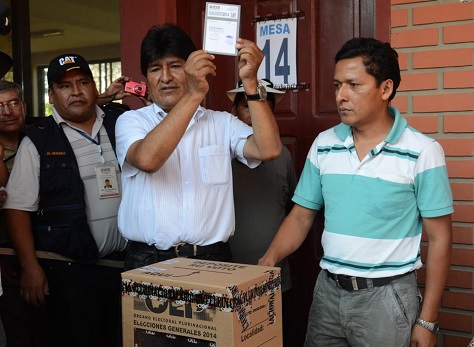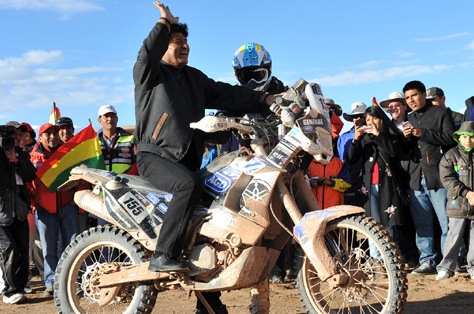
While chavismo seems like it’s falling apart two months after the death of Venezuelan president Hugo Chávez, many of his acolytes throughout South America continue to flourish.
That’s true in Ecuador, where Rafael Correa cruised to a third consecutive term in February 2013, and it’s looking increasingly true in Bolivia, where president Evo Morales now seems clear to run for a third term following a new law confirming that he can run for a new term, which follows a constitutional court ruling that Morales could run for reelection.
Under Bolivia’s constitution, the president may serve only two consecutive terms. Although Morales was first elected in December 2005, he cut his first term short after implementing a new constitution in 2009 and standing for a new election in December 2009. Morales and his allies claim that, under the new constitution, Morales is serving his first term, which is technically true. Bolivia’s constitutional court certainly ruled in his favor, and the law this week makes it all but certain that Morales will run, though he has yet to announce his reelection campaign for a general election expected in December 2014. The governing Movimiento al Socialismo (MAS, Movement for Socialism) has already indicated its support for Morales.
That’s a long way off, but Morales starts off as the favorite.
In a highly indigenous country, Morales remains a powerful symbol as the first indigenous president of Bolivia, and he’s been a champion of indigenous rights. When he took office in 2006, he was well-known as a leading indigenous politician with roots in the labor movement and, in particular, roots in the cocalero trade union in Brazil as a former coca-grower and a champion of campesinos — farm laborers. In office, he was one of the world’s most outspoken critics of U.S. efforts to eradicate coca in its own ‘war on drugs,’ and it’s a view that’s gained currency in subsequent years in Latin America and beyond.
As a leftist president, his economic program has been based widely on nationalization of Bolivian industry, especially the mining industry, and using state resources to improve the lives of impoverished workers. Despite an unconventional economic policy that involved price controls, Morales reduced the country’s inflation and brought about some measure of economic stability to one of South America’s poorest countries.
Moreover, Bolivian GDP growth remains strong at around 5% last year and in 2011, with even higher GDP forecasts for 2013. Bolivia’s future is a little brighter in light of its burgeoning lithium industry, given that its Uyuni salt flats boast the world’s largest reserves of lithium, a mineral used in smartphones and other electric devices.
But lithium development, which requires additional water from more fertile parts of the country, has conflicted with the indigenous communities that form the backbone of Morales’s political coalition, and he’s faced protests in 2010 over cuts in government subsidies for gasoline and protests in 2011 by indigenous groups in opposition to a planned highway through the Amazon basin.
Altogether, a largely fragmented opposition will still have a tough time challenging Morales. Continue reading Evo Morales pulls a Bolivian Bloomberg to run for third presidential term →
![]()



